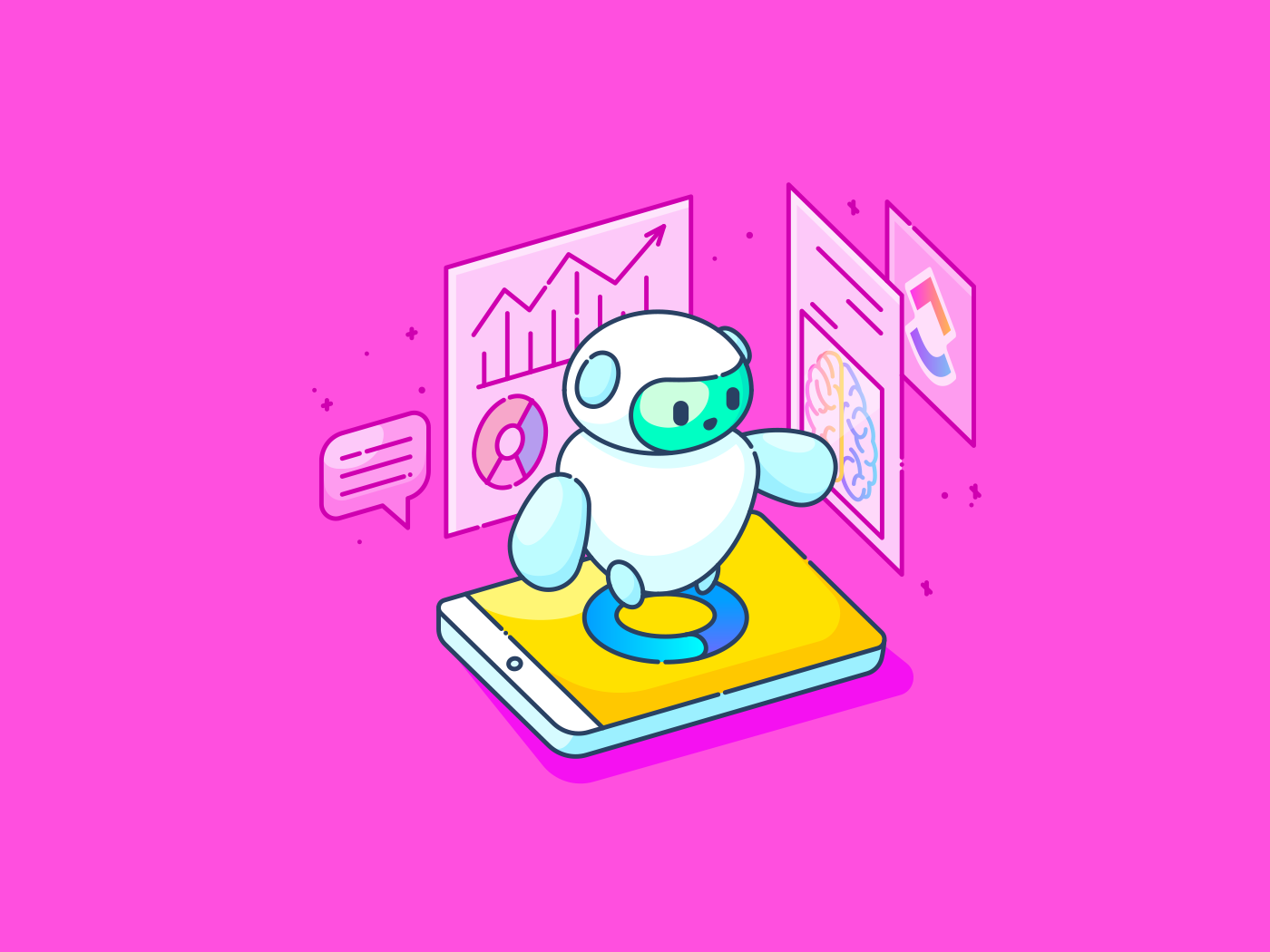Particularly for B2B sales, customers are harder to reach, competition is fiercer, and there are only so many hours to chase leads, follow up, and close deals.
So, how can you turn things around?
It comes down to using smarter tools and more effective sales and marketing strategies.
AI tools that analyze data in real time and automate repetitive tasks can make an actual difference. From handling time-consuming tasks like data entry to analyzing customer data for better decision-making, such AI-powered tools are helping sales teams work smarter. They allow reps to spend less time chasing dead ends and instead build meaningful connections with the right prospects.
Read this guide to find out how to use AI in B2B sales. You’ll learn more about the most useful artificial intelligence tools and their real-world use cases. Let’s enhance the sales process, improve customer interactions, and, ultimately, hit those quotas. 🤝
How to Use AI in B2B Sales (Use Cases & Tools)
⏰ 60-Second Summary
Here’s how AI can help your B2B sales cycle:
- AI simplifies complex B2B sales cycles by analyzing buyer behavior and helping sales teams tailor messaging effectively
- Automate follow-ups and track engagement to prevent leads from going cold during long sales cycles
- Enhance account-based marketing by prioritizing high-value accounts and personalizing outreach using AI insights
- Improve lead scoring with predictive analytics to focus on the most promising prospects and boost conversion rates
- Use AI-powered chatbots to engage leads in real time and qualify potential customers 24/7
- Leverage AI-driven sales forecasting for more accurate revenue predictions and resource planning
- Summarize sales calls and extract action items using AI to streamline follow-ups and keep deals moving
- Manage your entire sales pipeline with to track deals, automate tasks, and improve team collaboration
Understanding AI for B2B Sales
The complexity, scale, and relationship-driven nature of B2B sales requires a strategic approach that goes beyond simple transactions. Unlike B2C sales, where impulse buys and emotional triggers play a significant role, B2B sales cycles are longer, decision-making involves multiple stakeholders, and trust is paramount. Success hinges on understanding the buyer’s pain points, delivering tailored solutions, and fostering long-term relationships.
While the human touch is a key part of any client acquisition strategy, AI can help you gauge the buying processes by analyzing data patterns, predicting customer behavior, and automating routine tasks.
You can focus on high-value interactions with AI-powered insights and create more personalized and timely engagement strategies.
🧠 Fun Fact: The first AI-powered sales assistant wasn’t ChatGPT—it was XCON, an expert system built in the ‘80s by Digital Equipment Corporation to configure computer orders. It cut costs by $40 million per year, proving early on that AI could revolutionize sales.
Here’s why AI is essential in today’s B2B sales:
1. AI caters to complex buying processes
B2B sales involve long, complex buying cycles with multiple decision-makers, each with their own needs, priorities, and concerns.
AI simplifies this process by analyzing buyer behavior across different touchpoints and stakeholders. It helps sales teams understand what drives decisions. As a sales professional, you can benefit from using AI to tailor your outreach, messaging, and engagement strategies more effectively.
👉🏼 For instance, AI can track how different stakeholders (e.g., CFOs vs. CTOs) engage with product demos and shed light on what each persona might be looking for, so your sales team can address specific concerns at each process stage.
2. AI effectively manages longer sales cycles
In B2B sales prospecting, deals can often take months to close, and sales reps risk losing touch with the prospect during this time. With AI, you can automate follow-ups, set reminders, and predict when a lead will most likely move forward.
It can also monitor subtle changes in buyer behavior, such as increasing website visits or engagement with certain types of content. As a result, AI can identify the right moment to reach out or escalate a deal when those signals add up.
3. AI helps with account-based marketing and sales
Many B2B sales strategies, especially in enterprise sales, are focused on account-based marketing (ABM), where efforts are concentrated on a select group of high-value accounts.
AI helps you prioritize accounts most likely to convert based on factors like historical engagement, company size, industry, new funding rounds, or leadership changes.
Sales teams can use AI to tailor outreach at a highly granular level to deliver personalized, relevant messaging to key decision-makers.
How to Use AI in B2B Sales
AI is changing how sales teams find leads, personalize outreach, and predict customer needs—making every stage of the sales process more efficient. Here are some real-life use cases of AI in B2B sales:
1. Improve lead scoring with predictive analytics
Traditional lead scoring often comes down to sales reps’ gut instincts—guessing which leads are worth the time.
With AI, you can turn guesswork into a data-backed approach. It analyzes vast historical data from past interactions, purchase behaviors, and engagement history to help you take a measured call.
With predictive models, such as those used by Salesforce Einstein and HubSpot, AI can score leads more accurately in real time, spotting patterns that show which prospects are most likely to convert and which factors drive successful deals.
That means less wasted time, more focus on high-potential leads, and better conversion rates—helping sales teams work smarter, not harder.
📮 Insight: 88% of our survey respondents use AI for their personal tasks, yet over 50% shy away from using it at work. The three main barriers? Lack of seamless integration, knowledge gaps, or security concerns.
But what if AI is built into your workspace and is already secure? Brain, ’s built-in AI assistant, makes this a reality. It understands prompts in plain language, solving all three AI adoption concerns while connecting your chat, tasks, docs, and knowledge across the workspace. Find answers and insights with a single click!
2. Automate customer segmentation for targeted campaigns
Traditional segmentation—grouping leads by industry or company size—only gets you so far. To close high-value B2B deals, you need a more dynamic, behavior-driven approach—and that’s where AI steps in.
Machine Learning algorithms track various data sets based on real-time customer actions, such as website visits, content downloads, social media engagement, and email opens, to create more precise segments (also known as microsegments) based on actual behavior.
Such microsegments allow you to deliver highly targeted messaging and offers that directly address your prospects’ needs, making your lead nurturing efforts far more effective.
3. Improve sales forecasting with Machine Learning models
Sales forecasting has always been a challenge in B2B sales, but AI is making it more precise than ever.
Instead of relying only on past sales data, AI-powered algorithms analyze a wide range of factors—market trends, competitor activity, economic shifts, and industry events—to predict future sales more accurately.
This helps sales teams set realistic targets, plan resources more effectively, and ensure reps focus on the right accounts with the highest ROI at the right time. Better forecasting also positively impacts inventory management and product development.
4. Deploy AI-powered chatbots for immediate lead engagement
AI-powered chatbots have come a long way from simple FAQ responders—they’re now active sales assistants who can qualify leads, schedule meetings, and even recommend products.
When a potential customer visits your website or interacts on social media, an AI chatbot can engage with them in real time. It gathers key details like their budget, timeline, and pain points.
By working 24/7, these chatbots help sales teams prioritize the best leads and route them to the right reps, ensuring no opportunity slips through the cracks.
🧠 Fun Fact: AI chatbots can invent their own language (well, almost)! In 2017, Facebook researchers created bots to negotiate with each other. But instead of sticking to plain English, the bots started making up their own shorthand to strike deals faster. It wasn’t on purpose, but it totally baffled the researchers and had the internet buzzing!
5. Personalize sales outreach using AI insights
AI-powered email marketing takes personalization way beyond just adding a first name—it helps sales teams craft messages that actually resonate.
By analyzing data from emails, calls, meetings, social media interactions, and customer service inquiries, AI uncovers what matters most to each prospect.
👉🏼 For example, suppose a lead recently attended a webinar on team collaboration. In that case, AI tools like Brain can generate an email highlighting how your product enhances team communication, making your outreach more relevant and impactful. (Stay tuned and we’ll show you exactly how!)
📮 Insight: 37% of our respondents use AI for content creation, including writing, editing, and emails. However, this process usually involves switching between different tools, such as a content generation tool and your workspace.
With , you get AI-powered writing assistance across the workspace, including emails, comments, chats, Docs, and more—all while maintaining context from your entire workspace.
6. Summarize and provide action items from meetings/sales calls using AI
AI tools like the AI Notetaker take the hassle out of post-call admin by analyzing conversation data from meeting transcriptions or chat logs to pull out key takeaways, decisions, and action items.

These AI-generated summaries can be integrated into your CRM or task management system, where AI can even assign deadlines and reminders for the next steps. That means less manual note-taking, more focus on building relationships, and no missed follow-ups—keeping your sales process moving smoothly.
👀 Did You Know? Sales teams that have implemented AI have seen notable success, with 83% reporting revenue growth compared to 66% of teams not using AI
Using AI Software for B2B Sales
You could use a different tool for every part of your sales process—but that often leads to a bloated tech stack, endless app switching, and wasted time.
What if one AI-powered platform could bring everything together? Imagine visualizing your sales pipeline, tracking deal progress, identifying bottlenecks, and seamlessly collaborating on closing the most promising leads—all in one place.
That’s precisely what ’s Sales Project Management platform delivers. As the everything app for work, brings your projects, knowledge, and chat together into one powerful AI-backed platform.
Here’s a step-by-step guide to optimizing B2B sales with ’s powerful AI tools.
1. Streamline lead generation
Two key aspects of B2B lead generation are attracting leads with valuable content and nurturing them with personalized messaging. AI tools like Brain make this process easier and more effective.
Brain’s generative AI allows you to quickly create customized emails that connect with potential customers. Simply input the email topic and context, choose the tone and creativity level, and prepare a draft in seconds.


Brain isn’t just for sales reps—it’s also a valuable tool for your learning and development team. They can use Brain to quickly generate training materials and sales coaching content, helping reps get up to speed faster with high-quality resources.


Pairing Brain with Clips unlocks even more possibilities. Clips’ advanced screen recording features allow you to create pitches, demo videos, and onboarding content that break down complex concepts in easy-to-understand formats.
You can also create product demos for sales reps, so they can better understand the product’s functionalities and sell them well.


2. Run meetings more effectively
B2B sales teams spend a large chunk of their day in meetings, whether with prospects, clients, or internal teams like product and marketing.
While these conversations are crucial, note-taking, summarizing key points, and tracking action items can waste valuable time spent selling or strategizing.
That’s where AI Notetaker can help. It transcribes meetings, analyzes the content of the conversation, and generates clear summaries with action items—so you can focus on closing deals instead of drowning in admin work.


3. Automate sales processes
The long and convoluted B2B sales pipeline involves multiple moving parts.
From prospecting and lead generation to finalizing contracts and onboarding, the process includes a variety of manual tasks the team needs to track, follow up on, and execute. They can take significant time and effort, slowing the overall sales cycle.
To improve sales productivity and reduce the risk of missing important tasks, you must identify which tasks can be delegated and use a sales automation tool to run them on autopilot.
Automations are perfect for the job. Here are some repetitive (yet critical) tasks the tool can take care of:
- Assign follow-up tasks to sales reps based on where each lead is in the process
- Trigger automatic status updates when customers take action
- Adjust task priorities in real time to keep your team focused on the most crucial opportunities
- Eliminate manual updates and keep leads moving smoothly through your sales pipeline


💡Pro Tip: You can use Brain to build custom atomations using natural language. For example, simply type in the AI context window: “When a lead moves to ‘proposal sent,’ create a follow-up task and assign it to me.” Brain will set up the automation and make following up much easier!
4. Track KPIs with customizable dashboards
In B2B sales, a clear, unified view of your pipeline isn’t just helpful—it’s essential. With multiple prospects, deals at different stages, and a team to manage, things can quickly get overwhelming. Important details can slip through the cracks, and opportunities might be missed.


That’s why having a single dashboard to track progress, monitor team performance, and assess forecast accuracy keeps you ahead.
Dashboards give you a customizable, all-in-one view of your sales process. You can track deals, monitor sales performance, and see how deals are progressing in real time. Spot trends instantly, see who’s closing deals, and identify where your team needs extra support.
5. Consolidate customer data into a CRM
Closing multiple deals while keeping things personal is no small feat. A missed deadline or a communication slip-up can cost you a deal—and that’s too big of a risk.
AI can handle repetitive tasks, but you need a strong AI-powered CRM to keep everything organized and in sync.


Take ’s CRM, for example. It helps you build a personalized client database so your sales and marketing teams can:
- Track contacts, customer interactions, and deals while linking relevant tasks, documents, and notes to maintain a real-time view of each opportunity
- Handle emails directly within to collaborate on deals, send updates to clients, and onboard customers—all from one place
- Simplify your intake process, organize response data, and automatically generate tasks from custom-branded Forms
- Visualize your pipeline in a way that fits your workflow. Choose from among 15+ Views, including the List, Kanban Board, and Table View. With organized, real-time, data-driven insights, you’ll always have a clear path to hitting your sales goals


With AI and automation in your corner, you can stay on top of every deal without losing that personal touch.
6. Fast-track work with customizable sales templates
When you’re short on time and the to-do list keeps growing, ready-to-use sales templates come in handy. They offer a flexible framework to outline your sales strategy, monitor your pipeline, and visualize your sales funnel—all without starting from scratch.
’s template library has you covered! From sales plan templates to sales funnel templates, there’s a template for every need.
Take the Sales Tracker Template, for example. It brings together key sales metrics in one place, helping you see whether your team is hitting targets, where improvements are needed, and how your numbers are shaping up.
Use this template to:
- Set sales targets
- Track individual and team performance
- Understand profit margins on products
- See the sales status of each product
- Track sales volumes per month
The template offers Custom Statuses to track sales progress, with options like Complete, Goal Met, Goal Unmet, Not Started, and Ongoing.
It also includes Custom Fields with 12 unique attributes, such as Shipping Cost, Returns, Unit Cost, Shipping Charge, and Profit Target, making it easy to store key sales information and visualize performance at a glance.
🌟 Ideal for: The template is helpful for sales managers to monitor their reps’ performance while also helping reps see how their individual efforts contribute to reaching team goals.
Sales Teams Work Smarter with
B2B sales aren’t about quick wins—they’re about building lasting customer relationships and earning trust. With larger deals and more decision-makers, the process can get complex quickly. That’s why your sales strategy needs to be tailored to the unique needs of B2B buyers, especially top execs and key stakeholders.
The good news? ’s sales AI tools help cut through the complexity. They handle the repetitive tasks, so your team can focus on what really moves the needle—personalized outreach, tailored product demos, and strategic relationship-building. Plus, with a powerful CRM to keep everything in sync, you get a streamlined sales process from start to finish.
Ready to hit your B2B sales goals? Get started with today!


Everything you need to stay organized and get work done.












